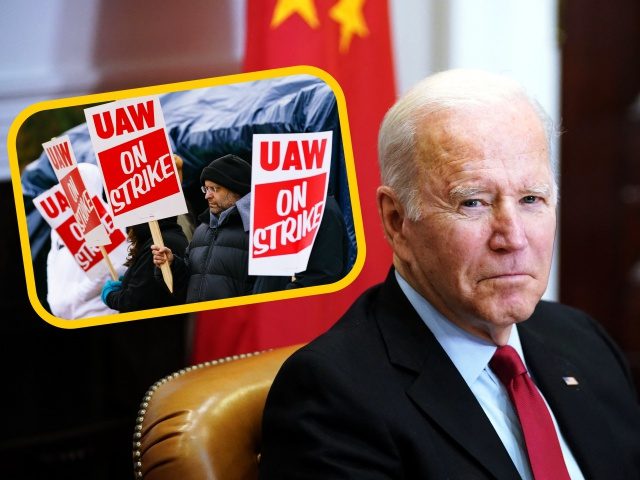Labor union executives, representing millions of American union workers, are blasting potential plans by President Joe Biden that would cut United States tariffs on China that were initially imposed by former President Trump.
In a letter to Biden’s Office of the United States Trade Representative, United Steelworkers (USW) President Thomas Conway praises the Trump administration for imposing U.S. tariffs on China while slamming suggestions that they ought to be cut.
Biden officials such as Janet Yellen and Gina Raimondo have both said, along with Biden, that the U.S. should review cutting tariffs on China — a trade policy that the Chinese Communist Party (CCP) is lobbying for in Washington, D.C.
Conway writes:
The overall tariffs that have been imposed, and the breadth of the sectors and products involved, were designed to address both the CCP’s policies and practices, and the impact on our economy, producers, and workforce. The tariffs on Lists 1, 2, 3, and 4a all play a part in leveling the playing field, and are an important component of the overall posture with China. The USTR engaged in a targeted approach in both its initial identification of tariffs and subsequent actions to advance U.S. interests. In part, the USTR’s actions were also designed to promote shifts in supply chains in order to limit the economic and strategic benefits inuring to the CCP, and to incentivize U.S. companies to reduce their reliance and dependence on Chinese producers. Coupled with the supply chain disruptions caused by the COVID-19 pandemic, the reorientation of our sourcing is a critical and unaddressed issue. [Emphasis added]
Too many U.S. companies have failed to take needed actions to address the threat posed by CCP policies. Many continue to outsource production, and research and development, undermining U.S. competitiveness and national security interests. They have failed to respond to the signals clearly and continuously sent by the CCP that it is not interested in competing, but in winning and dominating key industries. Our government must act in the national interest to strengthen our economy for the future. [Emphasis added]
Analysis by Breitbart News has shown that tariffs do not raise prices on Americans. The latest research from the Economic Policy Institute (EPI) notes that there is no connection between U.S. tariffs and current inflation.
“The timing of the tariffs clearly shows no correlation with inflation and eliminating tariffs could not plausibly restrain it,” EPI researchers write. “The bulk of the tariffs were in place before 2020, yet inflation only began accelerating in March 2021. Clearly, inflation was driven by many sources besides tariffs.”
U.S. free trade with China has had a devastating impact on America’s working and middle class communities across all 50 states. Conway, in his letter, touched on that impact:
The direct theft of U.S. Intellectual Property (IP) is estimated to be in the hundreds of billions of dollars annually. But this estimate fails to take account of the lost opportunities, the closed factories, the unemployed workers, and the loss of future opportunities to compete. [Emphasis added]
From 2001 to 2018, U.S. free trade with China eliminated 3.7 million American jobs from the economy — 2.8 million of which were lost in American manufacturing. During that same period, at least 50,000 American manufacturing plants closed down.
Those massive job losses have coincided with a booming U.S.-China trade deficit. In 1985, before China entered the WTO, the U.S. trade deficit with China totaled $6 billion. In 2019, the U.S. trade deficit with China totaled more than $345 billion.
Meanwhile, a study from 2019 found that permanent U.S. tariffs of 25 percent on all Chinese imports would create more than a million American jobs in five years. American manufacturing is vital to the U.S. economy, as every manufacturing job supports an additional 7.4 American jobs in other industries.
John Binder is a reporter for Breitbart News. Email him at jbinder@breitbart.com. Follow him on Twitter here.

COMMENTS
Please let us know if you're having issues with commenting.